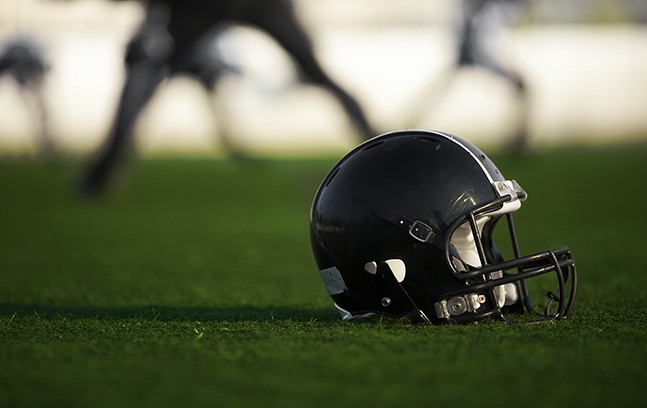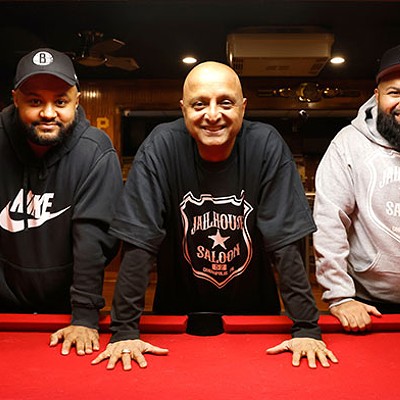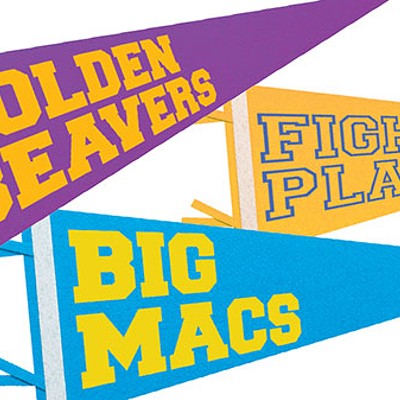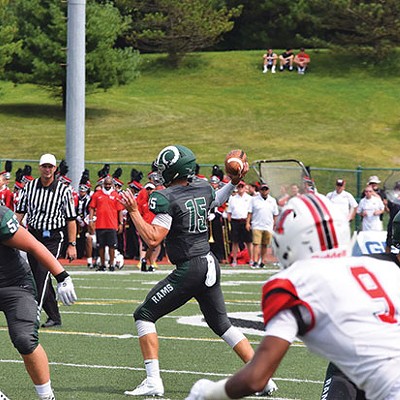A 27-year old nurse is hoping to win compensation for a head injury he says he sustained during a high school football practice more than 10 years ago.
In a civil suit leveled against the Pennsylvania Interscholastic Athletic Association, Western Pennsylvania Interscholastic Athletic League, and West Mifflin School District, former student Shane Skillpa claims his life has been permanently altered since a 2009 practice session where he broke his helmet during an “Oklahoma style” training drill, a controversial one-on-one or two-on-one drill which pits players against each other with a goal to knock the other player down. According to the suit, he was brought immediately back on the field and sustained a secondary impact shortly after.
Now, the suit claims, he suffers from a slew of symptoms that impact his ability to work and require a high intake of drugs to stave off the worst effects.
“He cannot live a normal life,” Anthony Plastino III, a lawyer representing Skillpa tells Pittsburgh City Paper. “He has to take strong psychotropic medications for the rest of his life.”
According to the civil complaint, the full extent of Skillpa’s injuries include “depression, anxiety, attention issues, memory recall impairment, inability to fall and/or stay asleep, fatigue, light sensitivity, and spatial perception issues.” The complaint also maintains Skillpa’s injuries put him at increased risk of developing “Parkinson's disease, neuro-endocrine dysfunction, Chronic traumatic encephalopathy,” and premature death.
Skillpa is seeking financial compensation, which, the suit says, he needs to manage his costly health care bills exacerbated by his reduced capacity to work. But Skillpa’s lawyers also say they hope to broadly raise the safety standards throughout high school sports.
“The case is about safety for high school students who participate in athletic sports, particularly in high school football players,” attorney Richard Sandow, also on Skillpa's legal team, tells City Paper. “And the concern is that concussion has been identified as a very serious issue for them. We know that in high school students, the brain is not fully developed and so they're even more susceptible to concussion."
Sandow also notes that high-profile cases against the NFL and college leagues have prompted new safety regulations in both cases. But, he says, high school sports remain less regulated.
“We know there's a lot of concussion cases at the college level," says Sandow. We know that in the pro-level — and they've set up huge funds to deal with it, they’re changing a lot of the rules of the NFL to deal with it — but ... at the high school level, this is new to have this kind of case.”
Sandow says the PIAA does have safety guidelines but lacks any kind of meaningful enforcement measures. The Oklahoma Drill was banned by the NFL in 2019.
“I think the PIAA and the WPIAL are way behind the times,” Sandow says.
In its 2022 medicine handbook, the PIAA states: “no athlete should return to play until cleared by a licensed physician of medicine or osteopathic medicine (MD or DO) comfortable with current concussion management principles.” The handbook also requires student-athletes and their parents to sign a form acknowledging the risks posed by concussions.
In pretrial statements, lawyers for the PIAA claim Skillpa cannot prove the league is responsible for any injuries he sustained during the 2009 practice. They also question Skillpa’s claim he was encouraged to return to the field based on testimony taken during depositions.
“Plaintiff has failed to, and cannot at trial, establish causation, as coaches, trainers, and school officials consistently testified that an injured student-athlete would be removed from play and not returned to play until cleared by a medical professional, regardless of PIAA guidelines,” the pretrial statement alleges.
It goes on to say that "fundamentally, the concussion allegedly experienced by the Plaintiff were the result of his participation in football, not any action by Defendant.”
The school district is also disputing Skillpa’s claims about the cause and extent of his injuries.
Skillpa did not seek redress through the courts from his 2009 injury until 2017, after a later medical diagnosis showed “new and serious distinct brain injuries,” according to the complaint.
The parties have collectively filed more than 200 documents since the suit began. Jury selection got underway today, and the trial is expected to last several weeks.
Among the many experts slated to give testimony is Bennet Omalu, a neuropathologist who autopsied late Pittsburgh Steeler Mike Webster and was portrayed by Will Smith in the 2015 blockbuster Concussion.
Webster died at age 50 in 2002, following years of mental and physical decline, which Bennet and others said was caused by recurring concussions sustained throughout his nearly 20-year career in professional football.
Sonny Jani, a close Webster associate who won a landmark 2005 lawsuit requiring the NFL to make disability payments to the late footballer’s estate, says much of the problems at the high school level boil down to a lack of education among coaches and a culture of toughness that discourages children from getting help.
“You’re taught not to speak because that makes you weak,” Jani tells Pittsburgh City Paper.
Dr. Randall Benson, a neurologist who testified to Congress in 2010 on “legal issues relating to football head injuries,” told City Paper enforcing clear guidelines can reduce the risk of head injuries, but notes they can never be eliminated.
“It doesn’t pay to legislate collisions out of football,” Benson says. “But you can legislate to minimize the exposure to impacts ... by restricting contact in practice.”
Regardless of what's on the books, Benson says safety guidelines will always come into conflict with a coach’s incentive to improve their team’s standing.
“They don’t get elevated to the next level unless they win,” he says. “The trainers and the coaches have to be willing to remove a guy from play at the first signs of head injury.”



















